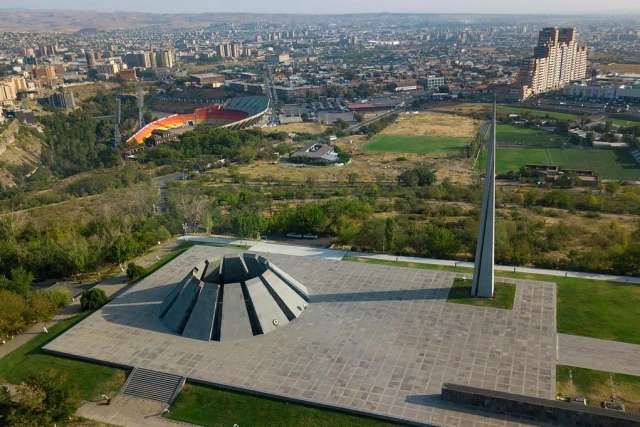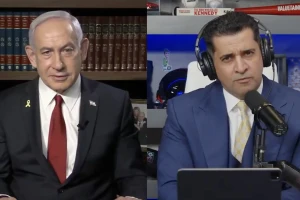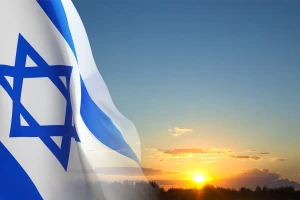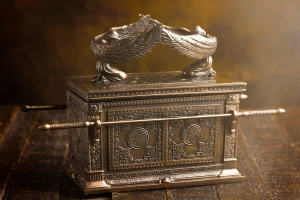Dissecting Netanyahu’s viral (yet unofficial) ‘recognition’ of the Armenian Genocide
While the news was broadcast positively, many in Israel say, ‘Baloney’

Benjamin Netanyahu was credited for recognizing the Armenian Genocide on a popular American podcast last week, setting the internet abuzz with surprise and accolades for his unexpected statements.
Israeli outlets reported the shocking news with one headline reading, “In first, Netanyahu says he recognizes Armenian genocide.”
But did the Israeli prime minister’s words represent official recognition of the killing of 1.5 million Armenians in Ottoman-era Turkey as “genocide?”
“Baloney,” said a resident of Jerusalem’s ancient Armenian Quarter, a view widely shared by many Armenians, Israeli academics and others.
"I wouldn’t call it a recognition, at least not a recognition by the State of Israel,” Yoav Loeff, a lecturer on Armenian history for Hebrew University, told ALL ISRAEL NEWS. “He was asked a question and I don’t know if he even thought about it thoroughly before he answered.”
In statements to the press, Armenian Prime Minister Nikol Pashinyan characterized Netanyahu’s interview as a “geopolitical bargaining chip which has no connection to Armenia or the genocide.”
“Do we want the genocide to be something uttered casually in an interview as a result of chance or confusion? I do not want us to place our martyrs in such a position,” he said.
Since then, the Prime Minister’s Office has declined to elaborate, and the interview exchange drew little (if any) response from the political establishment. Knesset Members contacted by ALL ISRAEL NEWS – even from the opposition – declined to comment on the exchange.
WHAT SENT THE WORLD ABUZZ
On Aug. 26, businessman and political commentator Patrick Bet-David interviewed Netanyahu, mostly related to the current war. At the end, Bet-David – an American of Armenian and Assyrian descent – asked Netanyahu why Jerusalem has yet to recognize the Armenian Genocide.
“If there’s any country that I would have expected to be on the list that recognized the Armenian, the Assyrian and the Greek genocides, it would be Israel,” Bet-David said. “Why haven’t you yet recognized the Armenian, the Assyrian and Greek genocide, that the Turkish did to that community?”
“In fact, I think we have because I think the Knesset passed a resolution to that effect,” Netanyahu replied.
Bet-David pressed: “I don’t know if that’s came from you though. I don’t know if its came from the prime minister of Israel.”
“I just did. Here you go,” Netanyahu said.
The “breaking news” instantly went viral, although the Knesset has not passed any such resolution and every attempt to do so has failed in Israel’s 77-year history.
Rabbi and activist Avidan Freedman said an “off-the-cuff statement, ‘Well, there, I did it’” is inappropriate – and inaccurate.
“It was incorrect, if we want to be generous about it, that the Knesset passed something,” the director of Yanshoof, an organization that monitors Israeli arms sales, told ALL ISRAEL NEWS. “This only highlights the fact that the Israeli Knesset has not even made this recognition, which is so morally important and should’ve been something they’ve done long, long ago.”
Israeli journalist Amit Segal broached the subject of timing, speculating that the Israeli government “has given up on any hopes of thawing relations with Ankara – or at least as long as (Turkish President Recep Tayyip) Erdoğan is around.”
Israel has long attempted to preserve good relations with Turkey, and more recently with Azerbaijan – an ally of Turkey and Israel - which also denies the genocide. But since Oct. 7, 2023, the Israel-Turkey ties have deteriorated. The Turkish foreign ministry said in a statement that Netanyahu’s remarks were “an attempt to exploit past tragedies for political motives.”
A few days later, Ankara cut off economic ties with the Jewish state – but in response to “massacres” in Gaza, not Netanyahu’s statements.
“As for making the declaration on a podcast, it’s not entirely clear whether it was deliberate, or a slip up by the prime minister,” Segal writes in his newsletter. “But whatever Netanyahu’s intention, what’s done is done, and many Armenians, Assyrians and Greeks will likely be all the more grateful for it.”
Or not.
“It’s humiliating,” said Hagop Djernazian, an Armenian resident of Jerusalem, who noted the prime minister didn’t use the words “Armenian” or “genocide.”
“Now, it’s not even important,” Djernazian said. “The country of Holocaust survivors had to be the first to recognize it. The U.S. did it five years ago. Israel is too late.”
Like other Armenians, Djernazian sees it as a political move.
“Netanyahu tried to use the Armenian Genocide in order to push back against the arguments by people and governments against his actions in Gaza,” he told ALL ISRAEL NEWS.
On his Facebook page, Djernazian stated, "No one should mistake his vague sentence of ‘Here, I just did’ as genuine recognition.”
“The Armenian Genocide is not a term to use for your own benefits, but to acknowledge it and recognize the first Genocide of the 20th century,” he added.
Because the topic has been omitted from school curricula, Israelis generally know little about the Armenian Genocide, Loeff said. However, he has detected a positive shift in recent years.
In Petach Tikva, a memorial to the Genocide was erected in 2020. In Haifa, the city dedicated Armenian Genocide Square in 2023. And this summer in Jerusalem, the city named a street “Elia Kahvedjian Square, survivor of the Armenian Genocide, photographer, lover of Jerusalem.”
“People are more aware, it is being spoken about, but still most people don’t learn about it in schools,” Loeff said.
After last week’s hype, the news petered out, and no official action was taken.
“If Netanyahu really means to recognize it, I would expect him to do something, to bring it to the Knesset, to push it forward, to make it happen,” Loeff said. “Basic moral decisions like recognizing genocides should be outside of politics. Israel declined doing it over the years, for tactical and strategic reasons, but certainly not moral.”
Some Israelis continue to insist that their country needs to make the prime minister’s words a reality.
“It would be a lovely thing for Israel to take a strong moral stand, even if it was potentially taking a risk or a hit in its international relations,” Freedman said. “At a time when there is so much anti-Semitism growing around the world, and Israel has been so adamant about the problem of Holocaust denial, this has been an outstanding moral stain on Israel.”

Nicole Jansezian is a journalist, travel documentarian and cultural entrepreneur based in Jerusalem. She serves as the Communications Director at CBN Israel and is the former news editor and senior correspondent for ALL ISRAEL NEWS. On her YouTube channel she highlights fascinating tidbits from the Holy Land and gives a platform to the people behind the stories.
You might also like to read this:











